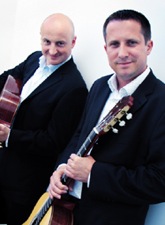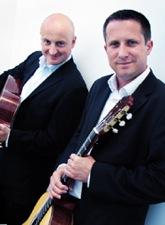
The evening began with an arrangement of Bach’s Concerto in D Minor for solo harpsichord, BWV 974, a piece that Bach based on an oboe concerto by Alessandro Marcello. The ritornello theme of the first movement was played with great musical and gestural intensity and subsequent elaborations with bravura and panache. The second movement was an Adagio performed as if it were a spontaneous and emotional improvisation and enhanced by sublimely beautiful ornamentation. An energetic third movement featured a great deal of contrapuntal interplay.
Yet Per Suonare a Due has a fascinating theatrical dimension that begins as an exploration of the aleatoric and atonal techniques espoused in the 1960s by such avant-garde European composers as Lutoslawski and Penderecki. Brouwer is a supremely musical composer and, though audiences often assume this material will be disagreeable, his unerring feel for the sensuous appeal of unusual sounds and textures, combined with an exquisite feeling for pacing and form, have led to a series of unusually successful modernist compositions.
Yet Per Suonare a Due has another fascinating dimension. While it begins with a fantastic exploration by the duo of an unusual sound world, one of the performers gradually seems to become disenchanted with the quality of the music he is playing and the ensemble gradually falls apart. First, phrases become shorter and the pauses between them become longer. Then, when one of the players tries to get the duo back on course, the other first responds with rude random notes as interruptions, then moves his chair to the far side of the stage, rips up some music, and finally begins aggressively playing some romantically beautiful tonal music. The overall effect is of a piece that’s both a hilarious mockery of the occasional pretentious seriousness of the ’60s avant-garde and at the same time a demonstration of the strange beauty and emotional depth that it sometimes achieved.
Provocative Playing Rewarded
The Eden Stell Guitar Duo were ideal interpreters of this complex music. Their humorous introduction set the audience at ease, their mastery of Brouwer’s atonal style showcased its inherent beauty, and their expressive physicality highlighted the inherent drama with a mime of grandiose pomposity, boredom, menacing aggression, and hurt feelings. The audience was, by turns, raptly silent, laughing out loud, and vigorously cheering.After this radical departure from concert norms, the recital alternated between reassuringly familiar Spanish music and new works written for the duo. Federico Moreno Torroba’s Estampas throbbed with the excitement of dance and the yearning of folk song. Phillip Houghton’s Wave Radiance, a minimalist work featuring repeated chords that the duo varied with a seemingly infinite palette of colors and finely graded dynamics, hypnotically captured the ocean waves of the composer’s inspiration. Frederic Mompou’s Canción y Danza No. V & VI were presented in arrangements for two guitars that captured their subtle, impressionistic beauty (though were sadly marred by intonation problems). Timothy Bowers’ Fantasy on an Old English Melody highlighted the duo’s wonderful sense of style in a set of variations in the manner of Elizabethan lutenists.
The grand finale was Joaquin Rodrigo’s Tonadilla. The opening Allegro, concise and brilliant, featured a brisk dialogue between the two guitars, punctuated by powerful strumming. The second movement, Minueto pomposa, had a lyrical, occasionally mischievous outer section that contrasted with an expressive song of exaltation underscored by bold rasgueado (strummed as opposed to plucked notes). In the concluding Allegro vivace, a dazzling first section is followed by slow music emphasizing the warm sonorities of the two guitars before concluding in a frenzied return of the opening motif.
The enthusiastic audience was brought back to Earth with an encore performance of Peter Maxwell Davies’ Scottish dirge, Farewell to Stromness, as well as humorously rewarded with a performance by four hands on one guitar of Premier Amour by Pattapio Silva.

